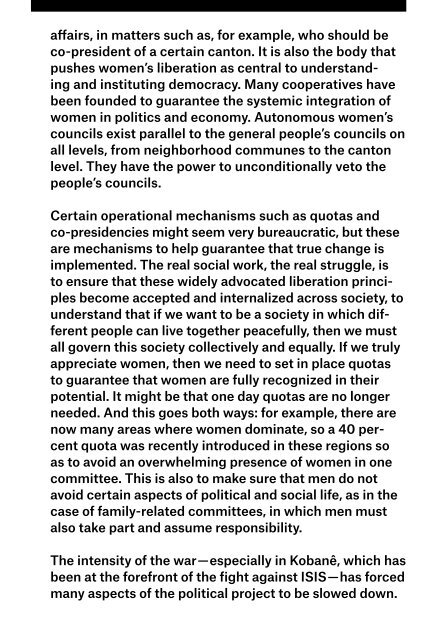Stateless Democracy
NWA5-Stateless-Democracy1.pdf?utm_content=buffer7beda&utm_medium=social&utm_source=twitter
NWA5-Stateless-Democracy1.pdf?utm_content=buffer7beda&utm_medium=social&utm_source=twitter
You also want an ePaper? Increase the reach of your titles
YUMPU automatically turns print PDFs into web optimized ePapers that Google loves.
affairs, in matters such as, for example, who should be<br />
co-president of a certain canton. It is also the body that<br />
pushes women’s liberation as central to understanding<br />
and instituting democracy. Many cooperatives have<br />
been founded to guarantee the systemic integration of<br />
women in politics and economy. Autonomous women’s<br />
councils exist parallel to the general people’s councils on<br />
all levels, from neighborhood communes to the canton<br />
level. They have the power to unconditionally veto the<br />
people’s councils.<br />
Certain operational mechanisms such as quotas and<br />
co-presidencies might seem very bureaucratic, but these<br />
are mechanisms to help guarantee that true change is<br />
implemented. The real social work, the real struggle, is<br />
to ensure that these widely advocated liberation principles<br />
become accepted and internalized across society, to<br />
understand that if we want to be a society in which different<br />
people can live together peacefully, then we must<br />
all govern this society collectively and equally. If we truly<br />
appreciate women, then we need to set in place quotas<br />
to guarantee that women are fully recognized in their<br />
potential. It might be that one day quotas are no longer<br />
needed. And this goes both ways: for example, there are<br />
now many areas where women dominate, so a 40 percent<br />
quota was recently introduced in these regions so<br />
as to avoid an overwhelming presence of women in one<br />
committee. This is also to make sure that men do not<br />
avoid certain aspects of political and social life, as in the<br />
case of family-related committees, in which men must<br />
also take part and assume responsibility.<br />
In spite of this, however, democratic confederalism and<br />
its aim of democratic autonomy have continued to develop<br />
and flourish, particularly in Cizîre canton, which is<br />
the largest and safest area, situated in the eastern-most<br />
part of Rojava. Not long ago, an alternative university, the<br />
Mesopotamia Academy of Social Sciences, was founded<br />
despite the ongoing war. There, dominant assumptions<br />
and methods around concepts such as knowledge and<br />
science are challenged and reinvigorated. One of the<br />
things people have learned in the process is that if you do<br />
not establish something parallel to your armed struggle,<br />
everything will crumble. The social revolution in Rojava is<br />
also a guarantee for the fight. It means that you establish<br />
something, you create structures that people are willing<br />
to protect because they represent a perspective that they<br />
desperately need.<br />
Very often the idea of radicalism is understood as needing<br />
something very opposed to what is happening<br />
around you at the moment. My understanding of what<br />
constitutes radicalism, or radical feminism in the case<br />
of the Kurdish issue, is that women are now recognized<br />
as equally capable of running life alongside men; that<br />
they have an autonomous organization, even an army;<br />
that they are teachers in schools; that they actively<br />
participate in the economy; that patriarchy is no longer<br />
seen as the norm; that women’s liberation has become<br />
a cherished aim of a revolution that seeks to change the<br />
mentality of society. And all of this in a region where the<br />
fact that a twelve-year-old girl could be married off to a<br />
seventy-year-old man used to be tolerated.<br />
50–51<br />
The intensity of the war — especially in Kobanê, which has<br />
been at the forefront of the fight against ISIS — has forced<br />
many aspects of the political project to be slowed down.<br />
You do not defeat ISIS or change society through individualistic<br />
actions that may appear radical because they<br />
are shocking, which is how radical feminism has been


